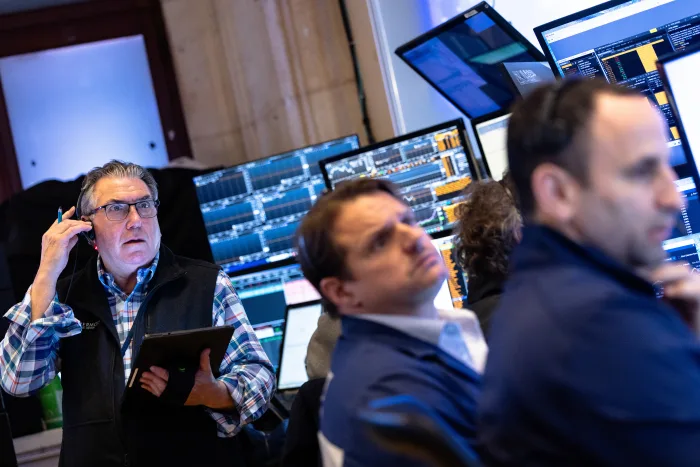Link copied
European Stocks Sink as Automakers Take Tariff Hit: Markets today.
stock :: 2025-03-27 :: source - bloomberg
By Anand Krishnamoorthy and Margaryta Kirakosian
 The German share price index DAX graph is pictured at the stock
exchange in Frankfurt, Germany. REUTERS/Staff/File
Photo
The German share price index DAX graph is pictured at the stock
exchange in Frankfurt, Germany. REUTERS/Staff/File
Photo
(Bloomberg) -- European stocks fell as the US pushed ahead with harsh tariffs on automakers and threatened more sweeping trade levies, reinforcing investor concern about the hit to global economic growth.
Most Read from Bloomberg
They Built a Secret Apartment in a Mall. Now the Mall Is Dying.
Why Did the Government Declare War on My Adorable Tiny Truck?
Trump Slashed International Aid. Geneva Is Feeling the Impact.
The Stoxx 600 slid 1% at the open. Stellantis NV, which makes the Jeep Compass SUV in Mexico, sank about 6%, with similar losses in Mercedes-Benz Group AG and BMW AG. S&P 500 futures dipped, while 10-year Treasury yields edged higher.
The quickly shifting US trade sanctions on the nation’s allies and foes alike adds to already heightened market concerns about the impact on global trade and economic growth. On Wednesday, President Donald Trump announced plans to add a 25% tariff on auto imports and suggested further duties on the EU and Canada, expanding a trade war and triggering threats of retaliation.
“With investors linking tariffs to higher recession risks, any form of trade restriction may trigger an initial rush to the exit – what we’re seeing in today’s session,” said Jun Rong Yeap, a market strategist at IG Asia.
(Get the Markets Daily newsletter to learn what’s moving stocks, bonds, currencies and commodities.)
The dollar fell against all its Group-of-10 peers as Trump downplayed reciprocal tariffs. Gold rose toward its record high, trading near $3,035 an ounce on haven demand.
Meanwhile, the European Union is preparing for a massive round of tariffs set to target the bloc as soon as next week and among its retaliatory options is considering to deploy one of EU’s most powerful trade-policy tools, the so-called anti-coercion instrument. The EU has built a robust toolbox since Trump’s first term, partially in response to his policies, that it can unleash in response to the expected tariffs.
St. Louis Fed President Alberto Musalem said it’s not clear the impact of tariffs will prove temporary, and cautioned that secondary effects could prompt officials to hold interest rates steady for longer.
“While we consider material increases in US tariffs will weigh on the US economy, we do not predict a US recession,” said Carol Kong, a strategist at Commonwealth Bank of Australia. “That said, market participants may still price a higher risk of a US recession as more tariffs are announced” which will push up the dollar against major currencies, she said.
Some of the main moves in markets:
Stocks
The Stoxx Europe 600 fell 1% as of 8:17 a.m. London time
S&P 500 futures were little changed
Nasdaq 100 futures fell 0.2%
Futures on the Dow Jones Industrial Average were little changed
The MSCI Asia Pacific Index fell 0.1%
The MSCI Emerging Markets Index fell 0.2%
Currencies
The Bloomberg Dollar Spot Index was little changed
The euro was little changed at $1.0764
The Japanese yen was unchanged at 150.57 per dollar
The offshore yuan was little changed at 7.2731 per dollar
The British pound rose 0.2% to $1.2912
Cryptocurrencies
Bitcoin rose 0.1% to $87,396.28
Ether rose 0.6% to $2,022.29
Bonds
The yield on 10-year Treasuries advanced one basis point to 4.36%
Germany’s 10-year yield declined four basis points to 2.76%
Britain’s 10-year yield was little changed at 4.72%
Commodities
Brent crude fell 0.5% to $73.63 a barrel
Spot gold rose 0.6% to $3,036.94 an ounce
This story was produced with the assistance of Bloomberg Automation.
--With assistance from Winnie Hsu, Abhishek Vishnoi, Chiranjivi Chakraborty and Michael G. Wilson.
Most Read from Bloomberg Businessweek
This week top market trends.
-
China to Inject $69 Billion Into Four Big Banks in Capital Boost
2025-03-30 :: general :: bloomberg -
Stocks could bounce, but big bank earnings hold the cards
2025-04-07 :: stock :: thestreet -
China's state asset regulator to support firms with share buybacks
2025-04-08 :: stock :: reuters -
Sony Begins Accepting USDC Payments in Its Singapore Online Store
2025-04-02 :: crypto :: coindesk -
Foxconn unveils 'Foxbrain' first large language model
2025-03-10 :: general :: reuters
Recent global market news
-

This Former Buffett Stock Is 1 of the Biggest Losers of the Market Rout, Plunging 40% in 1 Day
1day ago :: :: motley fool




